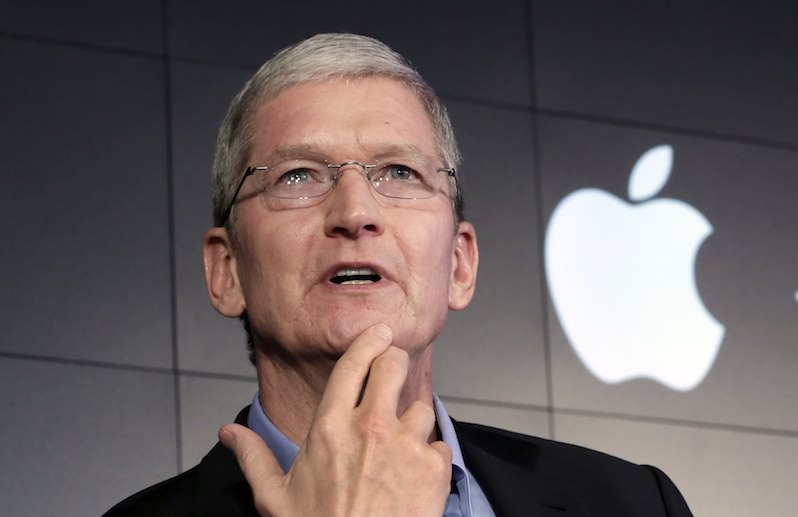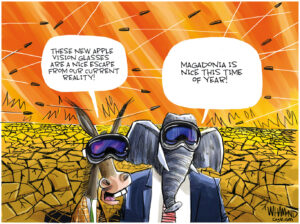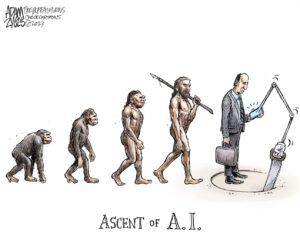Truthdigger of the Week: Apple’s Tim Cook
This week, it's a no-brainer. Tim Cook is our Truthdigger of the Week for his willingness to take on the "1984"-like security state with a statement of principle on behalf of privacy. "We are challenging the FBI’s demands with the deepest respect for American democracy and a love of our country," Apple CEO Tim Cook wrote in a message to customers. (Richard Drew / AP)
"We are challenging the FBI’s demands with the deepest respect for American democracy and a love of our country," Apple CEO Tim Cook wrote in a message to customers. (Richard Drew / AP)
Every week the Truthdig editorial staff selects a Truthdigger of the Week, a group or person worthy of recognition for speaking truth to power, breaking the story or blowing the whistle. It is not a lifetime achievement award. Rather, we’re looking for newsmakers whose actions in a given week are worth celebrating.
This week, it’s a no-brainer. Tim Cook is our Truthdigger of the Week. The Apple CEO’s willingness to take on the “1984”-like security state with a statement of principle on behalf of privacy keeps the spirit of the Fourth Amendment and the entire U.S. Constitution alive.
Tim Cook’s letter posted Tuesday on www.apple.com:
A Message to Our Customers
The United States government has demanded that Apple take an unprecedented step which threatens the security of our customers. We oppose this order, which has implications far beyond the legal case at hand.
This moment calls for public discussion, and we want our customers and people around the country to understand what is at stake.
The Need for Encryption
Smartphones, led by iPhone, have become an essential part of our lives. People use them to store an incredible amount of personal information, from our private conversations to our photos, our music, our notes, our calendars and contacts, our financial information and health data, even where we have been and where we are going.
All that information needs to be protected from hackers and criminals who want to access it, steal it, and use it without our knowledge or permission. Customers expect Apple and other technology companies to do everything in our power to protect their personal information, and at Apple we are deeply committed to safeguarding their data.
Compromising the security of our personal information can ultimately put our personal safety at risk. That is why encryption has become so important to all of us.
For many years, we have used encryption to protect our customers’ personal data because we believe it’s the only way to keep their information safe. We have even put that data out of our own reach, because we believe the contents of your iPhone are none of our business.
The San Bernardino Case
We were shocked and outraged by the deadly act of terrorism in San Bernardino last December. We mourn the loss of life and want justice for all those whose lives were affected. The FBI asked us for help in the days following the attack, and we have worked hard to support the government’s efforts to solve this horrible crime. We have no sympathy for terrorists.
When the FBI has requested data that’s in our possession, we have provided it. Apple complies with valid subpoenas and search warrants, as we have in the San Bernardino case. We have also made Apple engineers available to advise the FBI, and we’ve offered our best ideas on a number of investigative options at their disposal.
We have great respect for the professionals at the FBI, and we believe their intentions are good. Up to this point, we have done everything that is both within our power and within the law to help them. But now the U.S. government has asked us for something we simply do not have, and something we consider too dangerous to create. They have asked us to build a backdoor to the iPhone.
Specifically, the FBI wants us to make a new version of the iPhone operating system, circumventing several important security features, and install it on an iPhone recovered during the investigation. In the wrong hands, this software — which does not exist today — would have the potential to unlock any iPhone in someone’s physical possession.
The FBI may use different words to describe this tool, but make no mistake: Building a version of iOS that bypasses security in this way would undeniably create a backdoor. And while the government may argue that its use would be limited to this case, there is no way to guarantee such control.
The Threat to Data Security
Some would argue that building a backdoor for just one iPhone is a simple, clean-cut solution. But it ignores both the basics of digital security and the significance of what the government is demanding in this case.
In today’s digital world, the “key” to an encrypted system is a piece of information that unlocks the data, and it is only as secure as the protections around it. Once the information is known, or a way to bypass the code is revealed, the encryption can be defeated by anyone with that knowledge.
The government suggests this tool could only be used once, on one phone. But that’s simply not true. Once created, the technique could be used over and over again, on any number of devices. In the physical world, it would be the equivalent of a master key, capable of opening hundreds of millions of locks — from restaurants and banks to stores and homes. No reasonable person would find that acceptable.
The government is asking Apple to hack our own users and undermine decades of security advancements that protect our customers — including tens of millions of American citizens — from sophisticated hackers and cybercriminals. The same engineers who built strong encryption into the iPhone to protect our users would, ironically, be ordered to weaken those protections and make our users less safe.
We can find no precedent for an American company being forced to expose its customers to a greater risk of attack. For years, cryptologists and national security experts have been warning against weakening encryption. Doing so would hurt only the well-meaning and law-abiding citizens who rely on companies like Apple to protect their data. Criminals and bad actors will still encrypt, using tools that are readily available to them.
A Dangerous Precedent
Rather than asking for legislative action through Congress, the FBI is proposing an unprecedented use of the All Writs Act of 1789 to justify an expansion of its authority.
The government would have us remove security features and add new capabilities to the operating system, allowing a passcode to be input electronically. This would make it easier to unlock an iPhone by “brute force,” trying thousands or millions of combinations with the speed of a modern computer.
The implications of the government’s demands are chilling. If the government can use the All Writs Act to make it easier to unlock your iPhone, it would have the power to reach into anyone’s device to capture their data. The government could extend this breach of privacy and demand that Apple build surveillance software to intercept your messages, access your health records or financial data, track your location, or even access your phone’s microphone or camera without your knowledge.
Opposing this order is not something we take lightly. We feel we must speak up in the face of what we see as an overreach by the U.S. government.
We are challenging the FBI’s demands with the deepest respect for American democracy and a love of our country. We believe it would be in the best interest of everyone to step back and consider the implications.
While we believe the FBI’s intentions are good, it would be wrong for the government to force us to build a backdoor into our products. And ultimately, we fear that this demand would undermine the very freedoms and liberty our government is meant to protect.
Tim Cook
The Los Angeles Times weighed in on Cook’s legacy Thursday:
Unlike his predecessor Steve Jobs, Apple Chief Executive Tim Cook has never shied away from taking a political and social stand.
He was the first head of a Fortune 500 company to come out as gay. He pledged to one day donate his personal fortune to charity, and he talks passionately about the importance of social justice, diversity and the environment.
But it’s his hard-line stance on privacy that could define his legacy at Apple and set the tone for the way big corporations deal with big government at a time when so much of our lives unfold on the devices we use every day.
How far Cook is willing to take the fight is being tested on a national level now. He ramped up the debate Wednesday when he publicly and vehemently opposed a federal judge’s order to provide access to encrypted data on an iPhone belonging to the terrorist couple who killed 14 people in San Bernardino last year.
Challenging the order pits the world’s most formidable tech giant against its most powerful government and puts Cook in the hot seat as the voice of Silicon Valley on a long-contentious issue.
As Wired points out, Cook’s move makes business sense as well:
Your support matters…Apple has been trying to position itself as a protector of privacy, a kind of anti-Google, since long before the FBI’s court order. In 2014, Tim Cook claimed on Charlie Rose that Apple has no way to decrypt messages sent through iMessage (at least as long as you don’t back them up to iCloud). And at last year’s Worldwide Developers Conference, the company’s speakers repeatedly emphasized that although apps like Siri store your data, that data stays on your device and isn’t shared with Apple.
That positioning stands in stark contrast to Google, which is heavily dependent on advertising revenue and has an incentive to gather as much user data as possible. Yes, Apple runs the iAds network, so there’s a bit of spin involved in the Cupertino company’s positioning, but it’s true that Google and Apple have very different business models overall. That, combined with the way Apple makes it dead simple to encrypt the data stored on your iPhone or Macbook, has given Apple products a reputation of being secure yet easy to use. Complying with the FBI’s request would jeopardize the company’s image as the paragon of easy security.
Of course there’s also a risk in taking on the FBI. Even as some users take to Twitter to threaten a boycott of Apple if the company complies with the FBI’s request, others are threatening to do the same if Apple doesn’t help the agency. It’s impossible to predict how this will play out, especially in the fickle US consumer market, but there’s reason to think consumers will support Apple’s stand.
And as Truthdig Editor-in-Chief Robert Scheer explains in his book “They Know Everything About You: How Data-Collecting Corporations and Snooping Government Agencies Are Destroying Democracy”:
Americans had fought and died for the right to have privately developed papers, conversations, friendships, and diaries, especially in our homes. Yet here we were as a society voluntarily moving so much of that into digital spaces owned and managed by corporations we have no control over. This relinquishing of the most private information about one’s essence and aspirations became the norm in a shockingly short period, examined only lightly and in passing. As we shared more and more with ever-widening social networks, it seemed okay as long as the companies securely stored this precious data, to be used only to enhance the consumer experience. We counted on the self-interest of the corporation not to harm us, not to bite the hand that feeds.
For taking an uncompromising and unprecedented stand against the U.S. government’s latest assault on our privacy, Tim Cook is our Truthdigger of the Week.
–Posted by Jenna Berbeo
Independent journalism is under threat and overshadowed by heavily funded mainstream media.
You can help level the playing field. Become a member.
Your tax-deductible contribution keeps us digging beneath the headlines to give you thought-provoking, investigative reporting and analysis that unearths what's really happening- without compromise.
Give today to support our courageous, independent journalists.






You need to be a supporter to comment.
There are currently no responses to this article.
Be the first to respond.